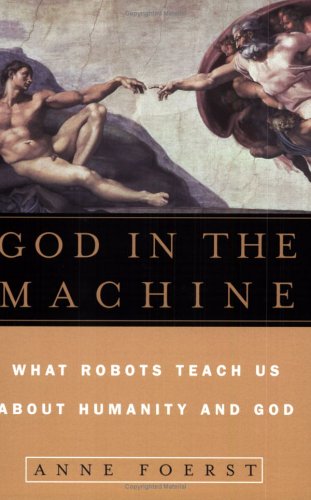
Synopsis
A thought-provoking analysis of the theological implications of artificial intelligence addresses important--and controversial--questions raised by robotics about the definition of humanity, what it means to have a soul, and what robots can teach us about our relationship with God. Reprint.
"synopsis" may belong to another edition of this title.
About the Author
Dr. Anne Foerst is a former research scientist at the Artificial Intelligence Laboratory at MIT, where she also founded and directed the God and Computers Project. The only robotics theologian in the country, her work has captured much media attention, including coverage in The New York Times, The Boston Globe, and Science. She is currently a visiting professor of theology and computer science at St. Bonaventure University.
"About this title" may belong to another edition of this title.
Other Popular Editions of the Same Title
Search results for God in the Machine: What Robots Teach Us About Humanity...
God in the Machine: What Robots Teach Us About Humanity and God
Seller: HPB Inc., Dallas, TX, U.S.A.
Paperback. Condition: Very Good. Connecting readers with great books since 1972! Used books may not include companion materials, and may have some shelf wear or limited writing. We ship orders daily and Customer Service is our top priority! Seller Inventory # S_445937987
God in the Machine: What Robots Teach Us About Humanity and God
Seller: HPB-Emerald, Dallas, TX, U.S.A.
paperback. Condition: Very Good. Connecting readers with great books since 1972! Used books may not include companion materials, and may have some shelf wear or limited writing. We ship orders daily and Customer Service is our top priority! Seller Inventory # S_439546477
God in the Machine: What Robots Teach Us About Humanity and God
Seller: ThriftBooks-Reno, Reno, NV, U.S.A.
Paperback. Condition: Good. No Jacket. Pages can have notes/highlighting. Spine may show signs of wear. ~ ThriftBooks: Read More, Spend Less. Seller Inventory # G0452286956I3N00
God in the Machine: What Robots Teach Us About Humanity and God
Seller: ThriftBooks-Dallas, Dallas, TX, U.S.A.
Paperback. Condition: Fair. No Jacket. Readable copy. Pages may have considerable notes/highlighting. ~ ThriftBooks: Read More, Spend Less. Seller Inventory # G0452286956I5N00
God in the Machine: What Robots Teach Us About Humanity and God
Seller: ThriftBooks-Dallas, Dallas, TX, U.S.A.
Paperback. Condition: Good. No Jacket. Pages can have notes/highlighting. Spine may show signs of wear. ~ ThriftBooks: Read More, Spend Less. Seller Inventory # G0452286956I3N00
God in the Machine: What Robots Teach Us About Humanity and God
Seller: ThriftBooks-Atlanta, AUSTELL, GA, U.S.A.
Paperback. Condition: Good. No Jacket. Pages can have notes/highlighting. Spine may show signs of wear. ~ ThriftBooks: Read More, Spend Less. Seller Inventory # G0452286956I3N00
God in the Machine: What Robots Teach Us About Humanity and God
Seller: PAPER CAVALIER UK, London, United Kingdom
Condition: as new. Appears unread. May have a retail sticker on back cover or remainder mark on the text block. Seller Inventory # 9780452286955-2
Buy Used
Ships from United Kingdom to U.S.A.
Quantity: 1 available
God in the Machine: What Robots Teach Us About Humanity and God
Seller: Toscana Books, AUSTIN, TX, U.S.A.
Paperback. Condition: new. Excellent Condition.Excels in customer satisfaction, prompt replies, and quality checks. Seller Inventory # Scanned0452286956

